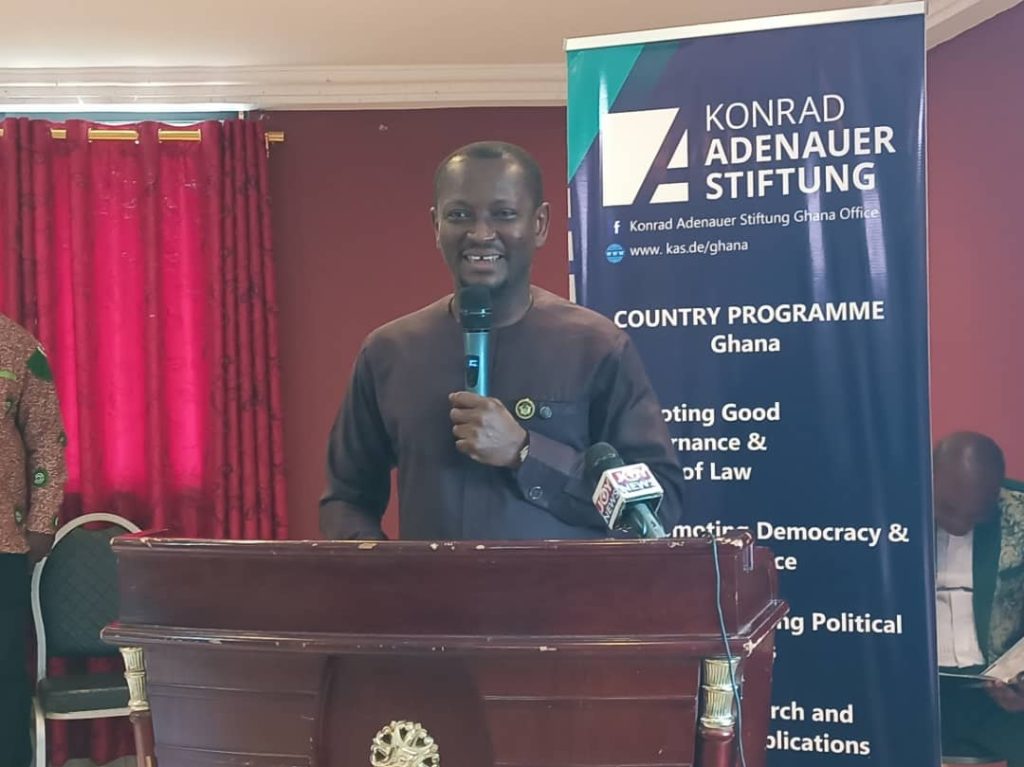By Nana Osei Kyeretwie
Abesim-Sunyani, May 16, GNA – Mr. Alfred Tuah-Yeboah, a Deputy Minister of Justice and Attorney-General has suggested the need for the creation of a special fund for chiefs to carry out some special development projects in their areas.
According to him, like the District Assemblies’ Common Fund (DACF), such a fund would facilitate for the chiefs, from the paramountcy jurisdiction to the community level to initiate and execute specific socio-economic development projects critical to enhance the well-being of the people.
Mr. Tuah-Yeboah made the suggestion on Tuesday in his opening remark as the Chair of the opening ceremony for the third annual conference and workshop for queen mothers underway at Abesim-Sunyani.
Organised by the Konrad Adenauer Stiftung (KAS), a German political foundation in partnership with the National Queen Mothers’ Platform and the Bono Regional Queen Mothers’ Association, the two-day event aims to explore the complex relations between traditional leaders and the modern legal and political systems in Africa on the theme “Traditional Leaders in Contemporary African Governance: The Clash of Laws, Authorities and Responsibilities”.
It is also to provide a forum for discussion and debate on other related important issues and “to explore ways in which traditional leaders can be integrated into modern governance systems while still maintaining their cultural identities and authorities”.
The entire paramount queen mothers from the Bono and Bono East Regions and two accredited representatives from the remaining regions nationwide are participating in the conference.
Mr. Tuah-Yeboah stated if the creation of the fund was considered and formulated as part of national development policy, its implementation would accelerate holistic national development.
That, he explained was because once every locality had a form of traditional leader, through the fund, every town or village across the country would benefit from a particular development project year in, year out.
He argued the absence of queen mothers as members of the judicial committees of the local, regional and national house of chiefs “cannot stand against any constitutional test”, saying as a nation it was therefore time for a due consideration to be given to that for public interest.
Dr. Arne Wulff, Resident Representative, KAS-Ghana in an address stated the chieftaincy institution existed to promote the general well-being of the society, saying that traditional leaders were therefore “not to be served but to serve” to enhance the daily lives of the people.

Nana Yaa Ansua, the Paramount Queen Mother of Drobo Traditional Area and the President, Bono Regional Paramount Queen Mothers Association in a welcoming address stated that learning had no limit, so the conference/workshop was a learning process for them to build on their knowledge as traditional leaders.
Nana Ansua, also the Executive Secretary of the Queen Mothers’ Platform – Ghana recalled the theme of their previous two conferences/workshops held in 2021 and 2022 in Sunyani and Akosombo respectively focused on mediation and arbitration, saying that informed the choice of this year theme and its related issues for discussion.
Nana Amponsah Dokua III, the Paramount Queen Mother of Osudoku Traditional Area and President of the Queen Mothers’ Platform-Ghana urged queen mothers to promote unity to attain continuous peace in their respective jurisdictions and localities because unity and peace were two vital ingredients for rapid progress in any society.
Established in 1955 and had since expanded its activities to more than 120 countries around the world, KAS promotes democracy, rule of law, social market economy and human rights.
It works closely with political, social and economic leaders in various countries to promote sustainable development, good governance as well as supporting political parties and civil society organisations in developing countries to strengthen their capacities to promote democratic processes.
GNA